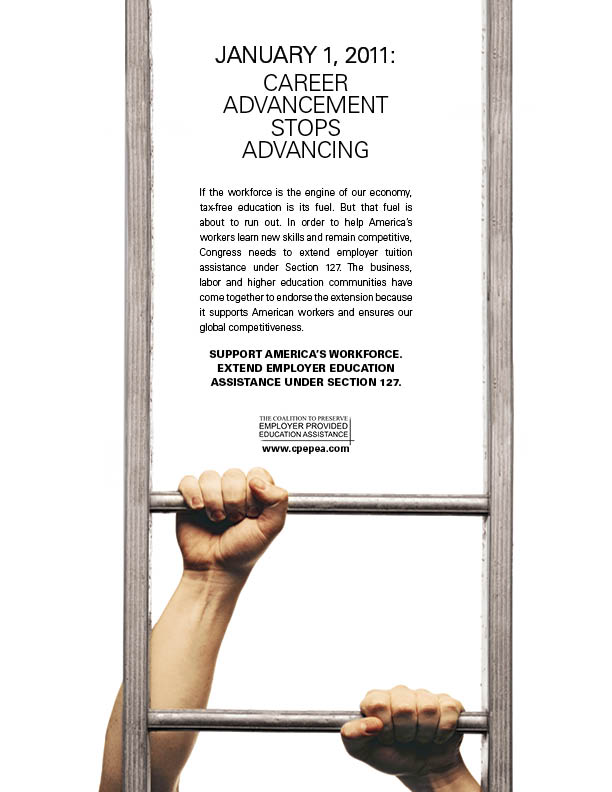As the clock winds down for the lame-duck session of Congress, a lot of attention is focused on tax issues affecting high-income people. But time is also running out on one provision -- facing expiration -- that can help anyone, plus make America more competitive. It's a key that can unlock opportunity for individuals and their families -- and make us stronger and more secure as a nation.
Known simply as Section 127 of the tax code, this is a provision that allows employees to receive up to $5,250 a year in tax-free tuition reimbursement from their employers. Thanks to that benefit, nearly a million American workers improve their skills -- and their futures -- every year.
And, because Section 127 is an investment in people, thousands of employers are better able to succeed in the global marketplace -- thereby protecting and even growing American jobs.
Everybody wins. But, inexplicably, Section 127 has been "temporary" since it was enacted 32 years ago. Eight times since then, for good reason, it's been extended. And now the latest extension expires at midnight on December 31. If Congress fails to act, we'll be closing the door on those workers who want to contribute more and achieve more.
Just as there has been good reason to extend this important benefit eight straight times, there is absolutely no good reason for it not finally being made permanent.
Education is the great enabler. It expands careers and perspectives, opens doors, and helps people achieve their goals.
As an administrator of a progressive community college in Oregon with a nationally-recognized Renewable Energy Technology program, I have the privilege of seeing people every day who have chosen to improve themselves. These are people who are re-directing their lives for the better. The power of hope surrounds them.
If achieving personal dreams and becoming a more valued employee aren't reasons enough to preserve Section 127, consider the coldly pragmatic side. I may be an idealist as a college administrator, but I'm a realist as a human resources professional. As chairman of the Society for Human Resource Management (SHRM), the world's largest association devoted to people management issues, I know that the key to any successful organization is having a skilled, knowledgeable and engaged workforce. This one simple tax provision -- so overlooked that's it's been temporary for 32 years -- makes companies stronger. This is true during times of economic booms or busts.
Employer-provided education assistance is an important tool for recruiting and retaining the best talent. That's why SHRM, with its 250,000 HR members, co-chairs the Coalition to Preserve Employer Provided Education Assistance, a group that includes top labor unions and the U.S. Chamber of Commerce. The Coalition's messages have appeared in op-eds and print ads nationally.

Here's a key point for any skeptical readers: This tax provision puts nothing in the pocket of the employer. Rather, Section 127 does prevent additional taxes on the employee, encouraging him or her to pursue education and training courses without taking on more financial burdens.
And we're not talking about funding classes of dubious value to the workplace. This is educational assistance for real people with real goals.
According to a report by SHRM and the National Association of Independent Colleges and Universities, the average beneficiary of Section 127 is 37 years old, earns $42,700 annually, receives a benefit of $2,700, and is taking classes in critical fields that benefit us all. That means the sciences, technology, engineering and math.
With more people better educated in those fields, we maintain our national competitiveness, and our society can address shortages in key workforce skills. As baby boomers retire and the face of the workforce is re-invented, Section 127 enables us to give current and future generations of workers the skills they need to help us stay ahead of the competition and prepare for what's coming next.
This is assistance for the preservation of American jobs and a stronger economy.
Fortunately, some members of Congress are still trying to beat the clock and save Section 127. Representatives Earl Pomeroy (D-ND) and Sam Johnson (R-TX) are fighting for their Employee Educational Assistance Act of 2010 (H.R. 5600), to make Section 127 permanent. And Sen. Chuck Grassley (R-IA) has a broader tax bill (S. 2851) that would lock in several educational tax provisions, including Section 127.
When the clock tolls midnight on New Year's Eve, my term as chairman of SHRM will end. I can step down with some satisfaction if I know that the same moment doesn't also announce the end of an important tool to make our workforce stronger, smarter, and more skilled.
Every human resources professional knows that getting the most out of your organization means bringing out the best in your people. Developing people -- our most important asset -- is the only way to anticipate change and ensure a successful future.
We can't be a nation of high wages and low skills. Our choice is clear and it must be made. It's time to make Section 127 permanent and get on with the task of helping every American worker reach his or her full potential. Our economic security and standard of living depend on it.